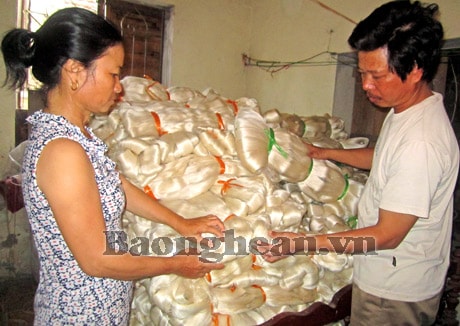Do Luong: Restoring and developing traditional crafts
(Baonghean) -In recent years, facing the risk of traditional craft villages and villages with traditional crafts disappearing, Do Luong district has had many support solutions to revive and continue to "keep the fire burning" in traditional craft villages to solve employment for rural workers.
These days, the Xuan Nhu silk spinning craft village in hamlet 3, Dang Son commune is bustling with the season. After a difficult time in terms of product output, the mulberry growing area in the 9 riverside communes is still being persistently promoted by many households, maintaining over 300 hectares (previously 500 hectares). Cocoon purchasing and silk production facilities are excited because the first crop of this year's season has seen cocoons selling well, at high prices, and not remaining unsold like every year.
Through research at the craft village, this season, the price of cocoons is 10 thousand VND/kg higher than every year, 95 thousand VND/kg of cocoons, the price of silk sold on the market has increased from 50-150 thousand VND/kg, the price is 700 thousand VND. Up to now, the craft village has produced 14 tons of silk, purchased over 100 tons of cocoons from localities with mulberry growing and silkworm raising profession in the district, Anh Son, Thanh Chuong, Tan Ky, Nam Dan.

Products of Xuan Nhu silk spinning village currently have high selling prices.
Mr. Tran Van Nga - Head of the Craft Village Cooperative, said: "Entering the production season, our village received attention from the province and district in investing in concrete roads, over 5 km long, with wastewater drainage ditches. In addition, 9 main production households have invested in building boilers worth 6-7 million VND/furnace/household, replacing the previous coal-burning technology with firewood-burning, saving costs, and increasing economic efficiency from 1 kg of silk/cocoon to 1.4 kg of silk/cocoon. The villagers are very happy and excited to continue to stabilize long-term production."
Tinh Gia carpentry in Thai Son has a long history with many high-end and civil wood products in the market inside and outside the province. In 2012, the Provincial People's Committee recognized the craft village, the production situation of the people here seemed to have a new spirit.
Mr. Nguyen Van Chat - a cadastral and construction officer - Thai Son Commune People's Committee, said: In addition to rice, carpentry is identified as a sustainable way out of poverty. Over the past years, the carpentry products of the people have dominated the market. Currently, the whole craft village has 67 households participating in the craft, 17 concentrated production facilities have invested in equipment and machinery for production of about 200 million VND/facility to improve quality and diversify products. According to the people's calculations, each working household has the income of nearly 60 million VND/year. From a purely agricultural locality with individual and fragmented carpentry production, up to now, people attached to the carpentry profession have been rising up to become rich legitimately in their homeland.
In the 2005 - 2010 term, Do Luong district focused on directing production development, restoring traditional craft villages, organizing training, introducing new occupations to create jobs for rural workers, contributing to the shift of labor force. In that spirit, the district has paid attention to maintaining and strengthening the development of some occupations such as civil carpentry, high-class carpentry in Thai Son, Trang Son; vermicelli, rice noodles in Tan Son, Trang Son; rice paper - peanut candy in the Town; rattan and bamboo weaving in Luu Son, Trung Son, Lac Son, Van Son; mulberry growing and silkworm raising in Dang Son, Luu Son, Bac Son... creating jobs for hundreds of rural workers. Up to now, the whole district has 4 craft villages recognized by the Provincial People's Committee, namely Xuan Nhu UTKS Craft Village (Dang Son), Da Lam weaving craft village (Da Son), Vinh Duc rice paper and peanut candy craft village (Town) and Tinh Gia civil carpentry craft village (Thai Son).
To implement the objectives set out in the project "Developing industry and handicrafts, building craft villages in Do Luong district in the period of 2011-2015", in 2012, the District People's Committee issued Decision 08 on supporting 40% of the cost of building craft village infrastructure (recognized by the Provincial People's Committee) including roads and drainage ditches in the concentrated production area of craft villages. Up to now, the whole district has completed and put into use works such as asphalt road of Da Lam weaving craft village, costing over 2 billion VND, concrete road, drainage ditch of Xuan Nhu UTKS Craft Village, costing over 5 billion VND, Concentrated area for exchanging, buying and selling raw materials and products of Vinh Duc peanut candy craft village...
However, through discussion with Mr. Kieu - Deputy Head of the Department of Industry and Trade of Do Luong district, the biggest difficulty currently facing the production of handicrafts and craft villages in the area is the technical requirements and income of workers. In fact, workers in craft villages mostly work based on experience, their level of understanding, applying and applying scientific and technological advances is still weak. In particular, due to the limitations in quality and design, the market output for products is still passive, leading to low prices, which partly affects the income of workers.
It is known that in the coming time, the district will prioritize the development of craft villages, allocating 2-3% of the local budget to build a fund for industrial promotion, trade promotion, investment promotion to support export goods, support preferential loans to build craft villages, focus on building raw material areas. At the same time, support craft villages to develop sustainably, build and connect with organizations and businesses strong enough to supply raw materials and consume craft products for people. The district directs localities to coordinate with relevant departments, schools, and vocational training centers in the province to foster and train technical and vocational skills for workers and long-term laborers.
Luong Mai






